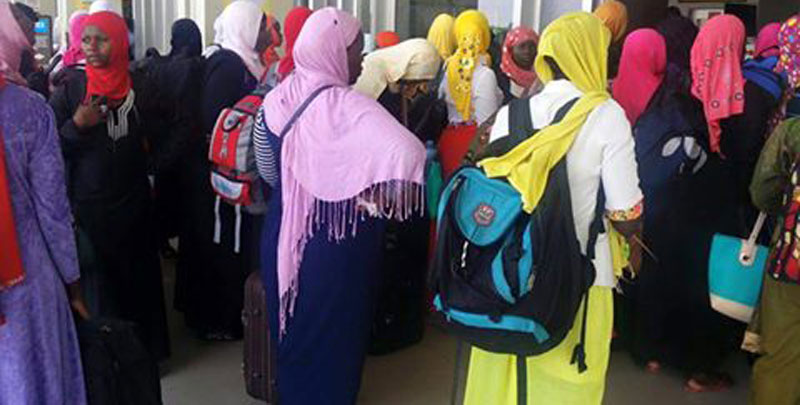The Awkward Life of Nkubakyeyo in Arab countries
Hundreds if not thousands of Ugandans these days leave the country every year for the Middle East Arab countries in search of greener pastures. However, testimonies of those those who have taken the plunge, narrate that they meet harsh realities of slavery.
Mike, not real name, abandoned his acting career here in Uganda to go to Dubai in search of a better paying job. He went through one of the more than 40 licensed labour recruitment agencies.
On reaching the Arab world, he encountered scary tales by Ugandans, mostly young women who had abandoned their original jobs and ventured into the ugly world of prostitution. Some explained that despite its enormous risks, the unenviable profession offered them more money but also that they had escaped the hostile life of slavery that was being meted out by their bosses in the Arab world.
Mike narrates to the Sunrise’s Allen Kisakye what most of the people go through.
Most workers go through the licensed labour companies. Most of these companies run hostels in Arab capitals such as Dubai, where they keep their newly arrived workers on the standby for anyone who wants them. But on arrival in Arab countries, most people, particularly girls, are forced to surrender their passports to the recruiting agency. This is done so that the worker can stay with the employer for an agreed period and not run away before the expiry of their contract.
For most girls, life usually takes an abrupt turn for the worse when they are forced to live a life of a slave at the hands of Arab boss. There is a deeply entrenched culture of slave ownership in the Arab world. Many people there, apparently believe that keeping a slave, more so a black person, is a sign of prestige.
Beyond owning a slave, many workers are loaded with all the house chores that forces them to wake up at 5 in the morning work throughout the day and retire almost at midnight.
Slavery in the middle east today is not as crude as it were in biblical times where a slave had no rights whatsoever. Today, although the owner ensures that he pays for the transportation of the person from their home countries, in addition to providing food, shelter, and health insurance, many people are heaped with a lot of work, in addition to being dispossessed of their travel documents.
What comes after the worker has landed in the boss’s home is a not so pleasant tale. Many are beaten, sexually abused while others are forced to perform backbreaking domestic chores from dawn till dusk at measly pay.
Poor working conditions in Saudi Arabia forced the government of Uganda to demand from Saudi Arabia for formal contracts between the employers and the individual workers in 2015. This has helped to reduce on abuses as bosses discovered they had to be accountable to some office if they mistreated their worker.
This has not wiped out torture. In fact many girls tend to runaway, sometimes jumping over fences to seek refugee in police when conditions become unbearable. Last year owing to endless accounts of torture from hundreds of Ugandan born domestic workers forced the government to impose a temporary ban on exportation of people to work in this category. High demand from many unsuspecting Ugandan women, and promises of better treatment from the Arab countries resulted into the lifting of the ban recently.
Many of those who escape from their bosses however, go underground, where the biggest and most lucrative occupation is prostitution. Although prostitution is a high paying dark job, it is illegal and when caught, results into imprisonment or deportation. But even when not caught, there are accounts of prostitutes who get killed and thrown in the dessert.
In addition, most of those who engage in it, ensure they do not keep any identification documents with them. So they become nameless. The underground industry has created a lucrative market for Ugandan passports. Because most of those that engage in the ‘flesh trade’ had previously run away from slavery, they are paperless.
But after some years of engaging in prostitution and other illegal underground businesses, many eventually reach a point of wanting to return home. Without papers, they cannot. The only way out, it has emerged, is to buy a valid passport on the open market.
To many Arabs, blacks are similar. The moment one presents a valid passport to emigration officers, they are given the green light without any serious scrutiny.
Arrival at Entebbe is where matters get more complicated as Ugandan immigration officers are more likely to detect the inconsistencies. According to reports from colleagues, many tend to bribe their way to sneak back into the country on forged documents. There are claims that people with such documents prepare at least $2oom along with the fake passports in order to let the man/woman in.
A single passport can be sold at Ushs8-9m. When a person is not planning to come back to Uganda very soon, he/she sales off their passport to someone coming back. And when time reaches when that person wants to came back he/she also buys from another one.
Timothy Atwiine, the Public Relations Officer at Ministry Of Internal Affairs, the Ministry is aware of such instances. However he adds that when they get people using passports that are not theirs, they confiscate them are penalize. This is done because it’s considered to be a National threat and Immigration can not allow anyone to use a passport that is not his or her on entering the country.








